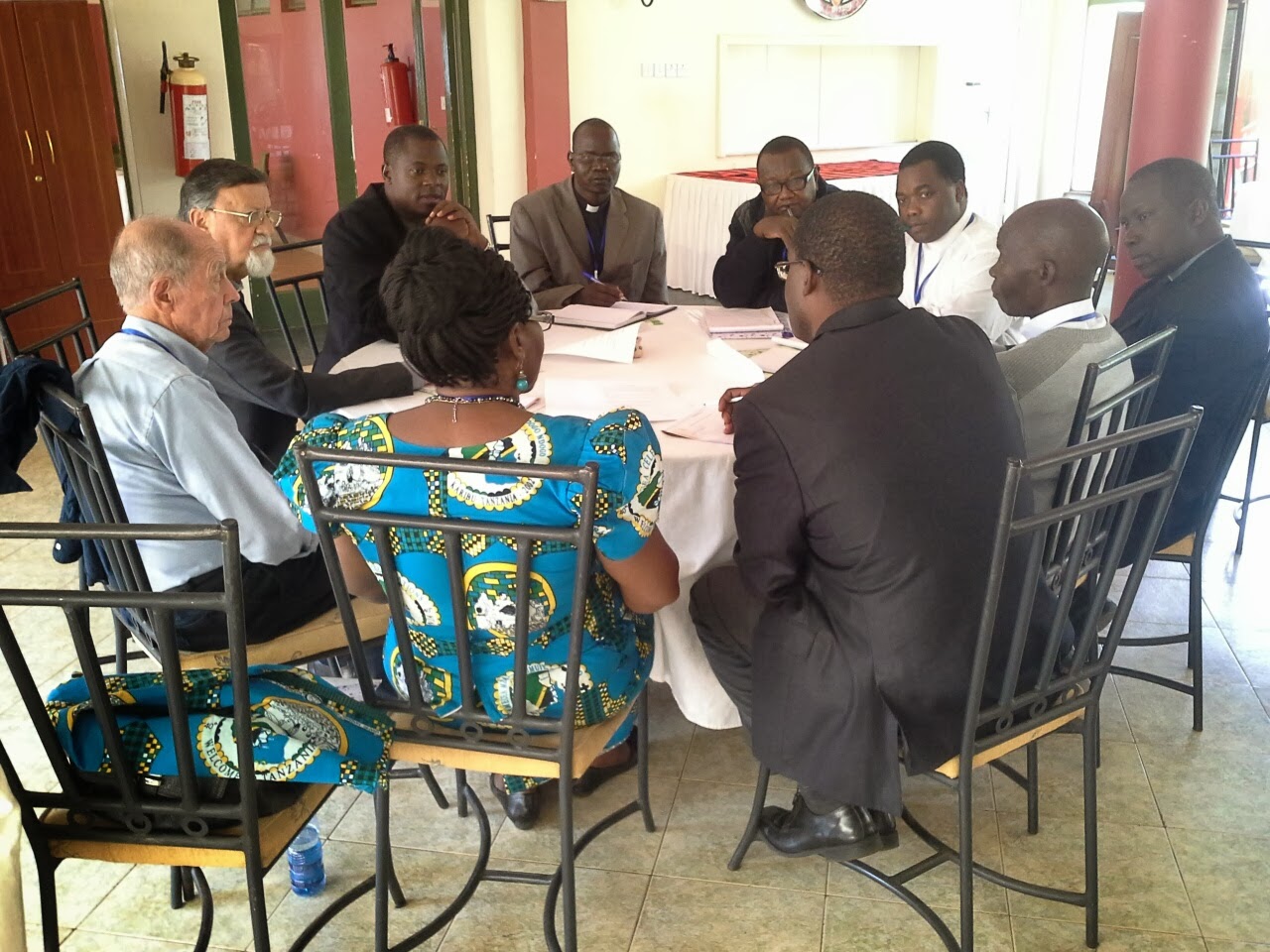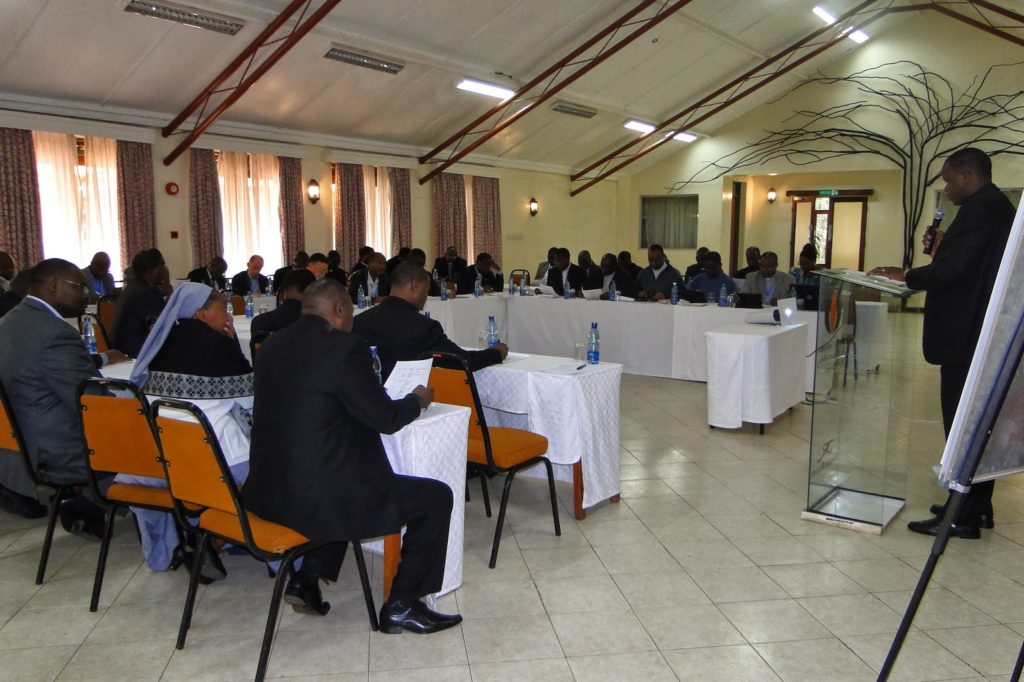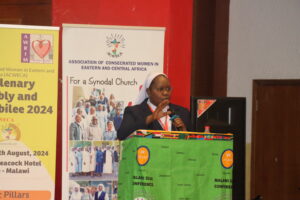AMECEA: AMECEA Workshop on Strategic Pastoral Plan

 |
| Delegates in a group discussion |
The
dream to realize a Ten-Year Strategic Pastoral Plan for AMECEA Region in now in
full force. Today October, 22nd 2013 at Jumuia Conference in Limuru Kenya,
a group of delegates from all AMECEA Conferences are meeting to deliberate and come
up with a draft that will be presented to the AMECEA Conferences for further deliberations
and finally to AMECEA Board for approval after which the document will be launched
during the next AMECEA Plenary, which is scheduled to take place in Malawi next
year.
AMECEA
Secretary General Fr. Ferdinand Lugonzo in his opening speech a chronological analysis
of where the idea of the strategic plan was conceived, what the Secretariat has
done so far, what is expected to happen during the two-day workshop and what is
expected to be an outcome of the workshop. Below is his presentation:
Secretary General Fr. Ferdinand Lugonzo in his opening speech a chronological analysis
of where the idea of the strategic plan was conceived, what the Secretariat has
done so far, what is expected to happen during the two-day workshop and what is
expected to be an outcome of the workshop. Below is his presentation:
 |
| Msgr. Pius Rutechura and Msgr. Kauta |
“In
this presentation, I wish to share with you the context within which we are
holding this workshop. It is through this presentation that we shall seek to
understand the task before us during these two days of intensive work.
this presentation, I wish to share with you the context within which we are
holding this workshop. It is through this presentation that we shall seek to
understand the task before us during these two days of intensive work.
In
my presentation, I will highlight the rationale behind the Bishops’ Resolution
No. 1 of the 17th AMECEA Plenary Assembly held in Nairobi in the
year 2011.
my presentation, I will highlight the rationale behind the Bishops’ Resolution
No. 1 of the 17th AMECEA Plenary Assembly held in Nairobi in the
year 2011.
I
will also try to put each one of us in picture of the key events that are now
affecting the life and action of the Church in our environment. Such is the
environment within which the AMECEA Ten Year Strategic Pastoral Plan shall be
drawn and implemented.
will also try to put each one of us in picture of the key events that are now
affecting the life and action of the Church in our environment. Such is the
environment within which the AMECEA Ten Year Strategic Pastoral Plan shall be
drawn and implemented.
At
the end I will briefly mention what has already been done with regard to the
Strategic Pastoral Plan and the specific role that we have been invited to
accomplish in this workshop.
the end I will briefly mention what has already been done with regard to the
Strategic Pastoral Plan and the specific role that we have been invited to
accomplish in this workshop.
I.
Resolution No. 1 of the Study Session (17th
AMECEA Plenary, 2011)
Resolution No. 1 of the Study Session (17th
AMECEA Plenary, 2011)
During
the last AMECEA Plenary, the Bishops charged the AMECEA Secretariat with the
responsibility of “Developing a comprehensive Ten Year Pastoral Plan comprised of
recommendations on various issues and concerns stated below (i.e, related
resolutions). The plan must include a theological
framework of addressing key issues and challenges of New Evangelization in
Solidarity in the AMECEA Countries”.
the last AMECEA Plenary, the Bishops charged the AMECEA Secretariat with the
responsibility of “Developing a comprehensive Ten Year Pastoral Plan comprised of
recommendations on various issues and concerns stated below (i.e, related
resolutions). The plan must include a theological
framework of addressing key issues and challenges of New Evangelization in
Solidarity in the AMECEA Countries”.
In
the above Resolution we read the concerns of our Bishops. In brief they want us to:
the above Resolution we read the concerns of our Bishops. In brief they want us to:
1. Develop
a Comprehensive Plan.
a Comprehensive Plan.
2.
To put our plan in the right
theological framework based on the mandate
that we have received as well as the vision and mission of the Association
while respecting the principle of subsidiarity.
To put our plan in the right
theological framework based on the mandate
that we have received as well as the vision and mission of the Association
while respecting the principle of subsidiarity.
3.
To address key issues which were
reflected in the other resolutions. Hence issues of: ownership of AMECEA and its Institutions, Initial and On-going Formation
of pastoral agents, Catholic Structures of Education, Small Christian
Communities, Apostolate to the Families, Studies on Early Christianity within
the Region, Establishment of Solidarity Fund, Sharing of Personnel, Revitalization
of Lay Movements and Groups, Promotion of Good Governance and Collaboration
with Regional and Continental Bodies, Promotion of Reconciliation, Justice and
Peace, Use of ICT in order to influence the Society, Capacity Building ,
Promotion of Ecumenism and Inter-religious dialogue, Environmental issues, Self
reliance, Promotion of true Sacramental life, issues of Violence against women
and issues concerning values and formation of the Youth and children.
To address key issues which were
reflected in the other resolutions. Hence issues of: ownership of AMECEA and its Institutions, Initial and On-going Formation
of pastoral agents, Catholic Structures of Education, Small Christian
Communities, Apostolate to the Families, Studies on Early Christianity within
the Region, Establishment of Solidarity Fund, Sharing of Personnel, Revitalization
of Lay Movements and Groups, Promotion of Good Governance and Collaboration
with Regional and Continental Bodies, Promotion of Reconciliation, Justice and
Peace, Use of ICT in order to influence the Society, Capacity Building ,
Promotion of Ecumenism and Inter-religious dialogue, Environmental issues, Self
reliance, Promotion of true Sacramental life, issues of Violence against women
and issues concerning values and formation of the Youth and children.
Indeed
these are concerns that we may not exhaust in one Strategic Pastoral Plan.
While some of these concerns can well be handled at National Episcopal
Conferences and at the AMECEA Secretariat, some will capture our attention as
matters that require long term plan for better implementation.
these are concerns that we may not exhaust in one Strategic Pastoral Plan.
While some of these concerns can well be handled at National Episcopal
Conferences and at the AMECEA Secretariat, some will capture our attention as
matters that require long term plan for better implementation.
II.
Key
Events in the Life of the Church and within AMECEA Region
Key
Events in the Life of the Church and within AMECEA Region
As
we labour to draw a relevant and practical Strategic Pastoral Plan within our
region, I wish to draw our attention to the following:
we labour to draw a relevant and practical Strategic Pastoral Plan within our
region, I wish to draw our attention to the following:
 |
| Strategic Plan Steering Committee |
1. That
there have been two Synods of Bishops for Africa: the first leading to the
Apostolic Exhortation Ecclesia in Africa with
an emphasis on the need for the Church in Africa to define herself more and
more as a family of God; the second has brought us the Apostolic Exhortation Africae Munus.
there have been two Synods of Bishops for Africa: the first leading to the
Apostolic Exhortation Ecclesia in Africa with
an emphasis on the need for the Church in Africa to define herself more and
more as a family of God; the second has brought us the Apostolic Exhortation Africae Munus.
Upon reception of Africae Munus we held a conference here
in Limuru to reflect on how to implement the message of Reconciliation, Justice
and Peace in our region. Indeed a lot has been done at different levels towards
the resolutions of this conference.
in Limuru to reflect on how to implement the message of Reconciliation, Justice
and Peace in our region. Indeed a lot has been done at different levels towards
the resolutions of this conference.
We at the AMECEA
Secretariat look at the message of Africae
Munus as the roadmap for the work of the Church in Africa for the present
and the future. Because of the weight of the matters addressed therein, we wish
to incorporate it in our Strategic Pastoral Plan and make it truly “AMECEA Munus”.
Secretariat look at the message of Africae
Munus as the roadmap for the work of the Church in Africa for the present
and the future. Because of the weight of the matters addressed therein, we wish
to incorporate it in our Strategic Pastoral Plan and make it truly “AMECEA Munus”.
2. That
Resolution No. 1 of the 17th AMECEA Plenary emphasized the fact that
our Strategic Pastoral Plan should address key issues and challenges of New
Evangelization. At this juncture it is worth noting that the actual celebration
of the Synod on New Evangelization has been concluded in Rome. While we are
waiting for the results of this Synod, AMECEA has already picked this as the
theme for the 18th Plenary which will be held in Lilongwe, Malawi in
July next year. The theme is: New Evangelization through True Conversion
and Witnessing to Christian Faith.
Resolution No. 1 of the 17th AMECEA Plenary emphasized the fact that
our Strategic Pastoral Plan should address key issues and challenges of New
Evangelization. At this juncture it is worth noting that the actual celebration
of the Synod on New Evangelization has been concluded in Rome. While we are
waiting for the results of this Synod, AMECEA has already picked this as the
theme for the 18th Plenary which will be held in Lilongwe, Malawi in
July next year. The theme is: New Evangelization through True Conversion
and Witnessing to Christian Faith.
In this regard, we wish
to share with you some of the topics of reflection during the study session of
the forthcoming Plenary. They include: Missionary
work of evangelization and the actual situation in our region, the environment
within which the Church is operating in the region, New evangelization as an
opportunity to work towards true conversion and witness to Christian faith
(emphasis on the role of family life and Small Christian Communities, Role of
Seminaries and other Houses of Formation in enhancing New Evangelization, Role
of Chaplaincies and Institutions of Higher Learning in Enhancing New
Evangelization, Influence/Impact/Role of new digital technology (ICT) and Social
Media in Evangelization work of the Church, and Liturgy and Inculturation in as
channels of New Evangelization.
to share with you some of the topics of reflection during the study session of
the forthcoming Plenary. They include: Missionary
work of evangelization and the actual situation in our region, the environment
within which the Church is operating in the region, New evangelization as an
opportunity to work towards true conversion and witness to Christian faith
(emphasis on the role of family life and Small Christian Communities, Role of
Seminaries and other Houses of Formation in enhancing New Evangelization, Role
of Chaplaincies and Institutions of Higher Learning in Enhancing New
Evangelization, Influence/Impact/Role of new digital technology (ICT) and Social
Media in Evangelization work of the Church, and Liturgy and Inculturation in as
channels of New Evangelization.
While we may not
pre-empt the discussions and deliberation of our Bishops during the study
session in July, if our Strategic Pastoral Plan shall stand the test of time,
we have to think through the philosophy of the next AMECEA Plenary and
incorporate the concerns of our Bishops in our Planning.
pre-empt the discussions and deliberation of our Bishops during the study
session in July, if our Strategic Pastoral Plan shall stand the test of time,
we have to think through the philosophy of the next AMECEA Plenary and
incorporate the concerns of our Bishops in our Planning.
III.
Approach
adopted for the Drawing of the Strategic Pastoral Plan
Approach
adopted for the Drawing of the Strategic Pastoral Plan
 |
| Plenary Session of Strategic Planing Workshop |
It
is important to note here that for a Strategic Plan to be operational, it must
be drawn by the people who will be involved in its implementation. This means
that the collection of data which will inform the actual making of the
Strategic Plan must include all the stakeholders.
is important to note here that for a Strategic Plan to be operational, it must
be drawn by the people who will be involved in its implementation. This means
that the collection of data which will inform the actual making of the
Strategic Plan must include all the stakeholders.
In
view of this, we have a steering committee drawn from AMECEA Secretariat Staff,
the Catholic University of Eastern Africa and the Catholic Relief Services.
This team has already developed questionnaires and circulated them to some
stakeholders within AMECEA. It has also carried out interviews from across the
episcopate of the region and the departments of the Secretariat.
view of this, we have a steering committee drawn from AMECEA Secretariat Staff,
the Catholic University of Eastern Africa and the Catholic Relief Services.
This team has already developed questionnaires and circulated them to some
stakeholders within AMECEA. It has also carried out interviews from across the
episcopate of the region and the departments of the Secretariat.
The
date that has come to us through the above methods has been already analyzed.
The team will be sharing with us a summarized report of the findings so that
they can inform our discussions.
date that has come to us through the above methods has been already analyzed.
The team will be sharing with us a summarized report of the findings so that
they can inform our discussions.
This
workshop is therefore charged with the duty of generating more information and
critically looking at the data we have so that we can come up with a draft
Strategic Pastoral Plan. With the help of our experts we shall go through all
the steps of strategic planning.
workshop is therefore charged with the duty of generating more information and
critically looking at the data we have so that we can come up with a draft
Strategic Pastoral Plan. With the help of our experts we shall go through all
the steps of strategic planning.
Our
hope is that after this, a copy of the draft Strategic Pastoral Plan shall be
circulated to all the member Conferences and that after receiving feedback from
them, the final Draft shall be drawn and presented to the AMECEA Executive
Board in March and with its approval, later to be presented for approval to the
18th AMECEA Plenary in July 2014.
hope is that after this, a copy of the draft Strategic Pastoral Plan shall be
circulated to all the member Conferences and that after receiving feedback from
them, the final Draft shall be drawn and presented to the AMECEA Executive
Board in March and with its approval, later to be presented for approval to the
18th AMECEA Plenary in July 2014.
Conclusion
I
wish to thank you all for coming and pray that each one of us will feel part of
this noble task and contribute generously.
wish to thank you all for coming and pray that each one of us will feel part of
this noble task and contribute generously.
I
wish you very fruitful discussions. Once again welcome to Kenya.”
wish you very fruitful discussions. Once again welcome to Kenya.”
By
Fr. Ferdinand Lugonzo-Secretary General – AMECEA
Fr. Ferdinand Lugonzo-Secretary General – AMECEA
Source:
AMECEA Social Communications
AMECEA Social Communications


